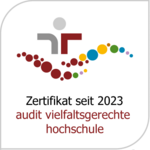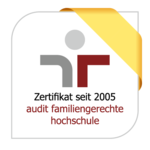Paderborn University gender proportion statistics
Paderborn University regularly collects gender equality data on its students and employees. These gender-specific statistics form the basis for analyzing the situation of women in academia and describe the trend in the proportion of women represented at Paderborn University’s various different academic qualification levels. The statistics identify any need for action and form the basis for the university’s gender equality policies.
The statistics are based on data from Paderborn University’s Student and Graduate Index and from Central University Administration, Division 1.3.
Detailed statistics
In recent years, the gap between numbers of male and female students at Paderborn University has been increasingly closing. In 1999, the proportion of female students stood at 40.6%, rising to 47.9% by 2019.
The diagram above shows the trend in numbers of male and female graduates since 1999. In line with the rising number of female students, by 2003, the number of female graduates had also risen. 2004 was the very first year to see more women (51.1%) than men complete their degree at Paderborn University. The male/female graduate ratio has since balanced out, with annual fluctuations. In 2018, 52.9% of graduates were women.
In 1999, the proportion of women on PhD programs at Paderborn University stood at 21.6%. Despite a high proportion of female graduates (approximately 50%), there is still a clear gap between the numbers of female and male PhD students. In 2018, the proportion of women on PhD programs was 36.6%.
With regard to Paderborn University’s non-professorial academic staff, the proportion of women employed here grew from an initial underrepresentation to a gender balance – from 17.5% in 1999 to 43.5% in 2018. In 2019, this figure stood at 42.4%.
Due to a change in the recording period for Paderborn University statistics, no data records are available for the calendar year 2003.
The number of women in W2/C3 professorships has risen sharply since 1999, when just 12.7% of W2/C3 professors were female; this figure grew to 38.2% in 2011. Following a brief decline in 2012 to 34.7%, the proportion of female W2/C3 professors saw an upward trend, rising to 48.8% by 2018.
Due to a change in the recording period for Paderborn University statistics, no data records are available for the calendar year 2003.
Despite an increase over the period in question, women are still significantly underrepresented in grade W3/C4 positions. While the proportion of women in all professorships at Paderborn University in 2018 equated to 37.4%, just 26.5% of all W3/C4 professors were women. In 1999, the proportion of female W3/C4 professors was just 7.4%; in 2019, this figure stood at 24.8%.
Due to a change in the recording period for Paderborn University statistics, no data records are available for the calendar year 2003.
For many years now, Paderborn University has occupied a leading position in Germany for the proportion of women it employs in professorships. In 1999, just 10.0% of professorships at Paderborn University were held by female academics and researchers. By 2018, this figure stood at 37.4%, rising to 35.5% in 2019.
Due to a change in the recording period for Paderborn University statistics, no data records are available for the calendar year 2003.
The diagram above shows the university’s different academic qualification levels and the respective gender gap within these levels at Paderborn University in 2018, from student up to professorship. In the first two qualification levels (students and graduates), men and women are approximately equally represented; the situation is similar at W2/C3 professorship level. However, it is evident that women are underrepresented in the remaining qualification levels.
Overview
audit vielfaltsgerechte…





